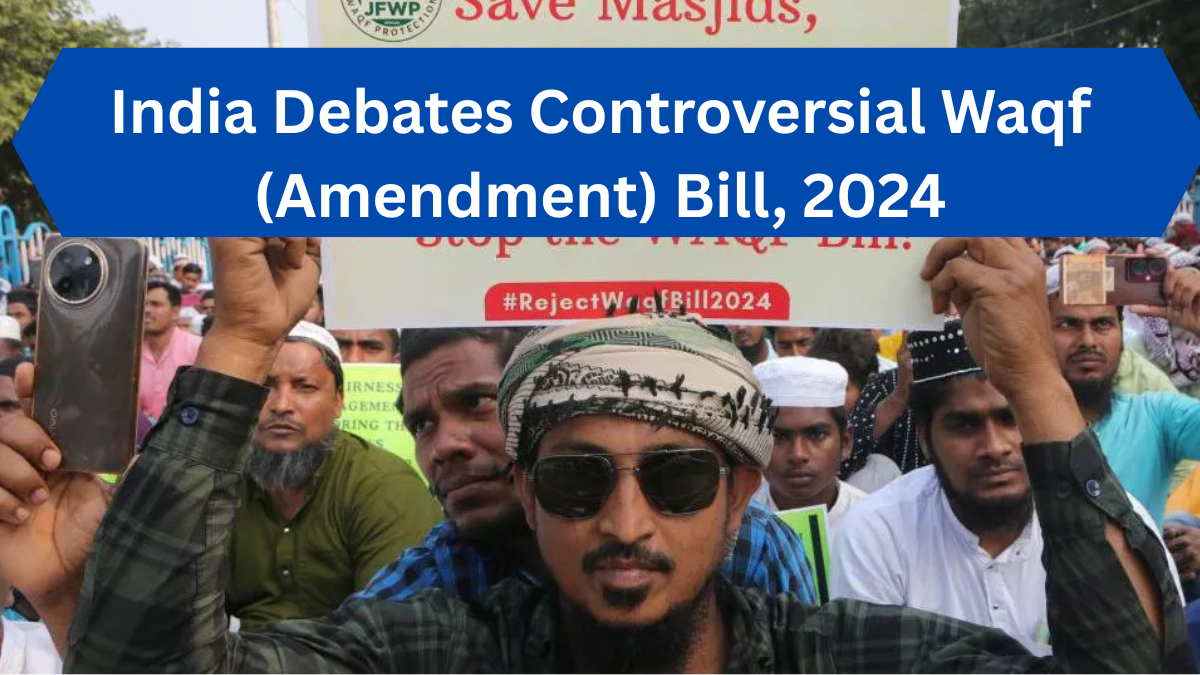Indian lawmakers are currently engaged in a heated debate over the Waqf (Amendment) Bill, 2024, a legislation that seeks to alter the governance of waqf properties—assets worth billions of dollars donated by Indian Muslims over centuries. While the government claims the bill aims to bring transparency, opposition parties and Muslim groups view it as a move to undermine the constitutional rights of India’s largest religious minority.

Key Highlights of the Waqf (Amendment) Bill, 2024
- Introduces several amendments to the existing waqf law.
- Aims to bring transparency in the management of waqf properties.
- Incorporates 25 changes recommended by a joint parliamentary committee (JPC).
- Proposes induction of two non-Muslim members on waqf boards.
- Grants the government authority to regulate waqf management.
- Allows the government to determine whether a property qualifies as “waqf.”
- Seek to prevent illegal encroachments on waqf lands.
Government’s Perspective: Transparency and Reform
The ruling Bharatiya Janata Party (BJP) government, led by Prime Minister Narendra Modi, insists that the bill is necessary to streamline waqf property management and ensure better oversight.
Arguments in Favor:
- Ensures better governance and accountability in waqf property management.
- Addresses misuse of waqf lands and prevents illegal encroachments.
- Implements key recommendations from the JPC, making the bill more balanced.
- Enhance administrative efficiency by bringing structured reforms to waqf boards.
- Establish a framework for dispute resolution related to waqf properties.
According to Minority Affairs Minister Kiren Rijiju, the opposition is misleading the public, spreading rumors that the bill would strip Muslims of their rights. He emphasized that the amendments are based on the JPC’s recommendations and have been carefully evaluated.
Why the Opposition and Muslim Groups Are Protesting?
The bill has sparked widespread opposition, particularly from the Congress party and Muslim organizations, who argue that it is designed to diminish waqf protections and infringe on the autonomy of religious endowments.
Concerns Raised by Opponents:
- The bill allegedly weakens waqf laws, enabling government control over religious properties.
- Government interference in religious endowments sets a dangerous precedent.
- The inclusion of non-Muslim members in waqf boards is seen as an attempt to dilute Muslim representation.
- Opponents argue that religious institutions run by non-Muslims do not allow individuals from other faiths in their administration, so why should waqf properties be treated differently?
- Critics fear that the changes might lead to the reclassification or sale of waqf lands for commercial use.
Congress MP Mallikarjun Kharge criticized the bill, calling it “unconstitutional and divisive.” He emphasized that the opposition is united in resisting what they view as an attack on minority rights.
Understanding Waqf Properties
Waqf properties are charitable and religious endowments donated by Muslims for the benefit of the community. These include:
- Mosques – Places of worship maintained through waqf donations.
- Madrassas (Islamic schools) – Institutions providing religious and general education.
- Shelter homes – Facilities offering housing and support to underprivileged individuals.
- Graveyards – Burial grounds maintained under waqf administration.
- Thousands of acres of land – Often used for charitable activities or leased to generate revenue for community welfare.
Key Facts About Waqf Properties in India
| Total Waqf Properties | Approximate Land Area | Estimated Value |
|---|---|---|
| 872,351 | 940,000+ acres | $14.22 billion |
By Islamic tradition, waqf properties are considered to belong to God and cannot be sold or repurposed. Critics argue that the proposed amendments undermine these sacred principles, paving the way for government intervention in religious assets.
What Happens Next?
Legislative Process
- Lok Sabha Vote: The bill needs a majority (over 272 votes) in the lower house.
- Rajya Sabha Review: If passed in Lok Sabha, it moves to the upper house for further discussion and approval.
- Presidential Assent: If both houses approve, the bill will be sent to President Droupadi Murmu for final approval before becoming law.
Political Standpoint
- BJP and Allies: Likely to vote in favor, ensuring the bill’s passage.
- Congress and Opposition Parties: Expected to vote against, citing constitutional concerns.
- Muslim Organizations: Actively lobbying against the bill, calling it an attack on minority rights.
While the Congress and other opposition parties are expected to vote against the bill, the BJP’s coalition is likely to secure enough votes for passage, barring any major surprises.
FAQs
1. What is the main purpose of the Waqf (Amendment) Bill, 2024?
The bill aims to introduce transparency and regulatory reforms in the management of waqf properties. The government argues that it will help prevent misuse and encroachments while ensuring better governance.
2. Why are Muslim groups opposing the bill?
Muslim organizations believe that the bill weakens waqf laws, grants excessive power to the government over religious properties, and opens the door for the seizure or repurposing of waqf assets.
3. How does the bill propose to change waqf boards?
The bill introduces a provision for two non-Muslim members on waqf boards, which critics argue is an unfair intervention in a religious institution. They contend that other religious organizations do not face similar government-imposed changes.
4. What will happen if the bill is passed?
If the bill clears both houses of parliament and gets presidential assent, it will become law, significantly altering how waqf properties are governed in India. It could lead to greater government control over waqf assets, a move that has sparked controversy and protests.
As the debate continues, the fate of the Waqf (Amendment) Bill, 2024 remains uncertain. Will it bring transparency or stir further controversy? Only time will tell.
Click here to learn more
Pari is a passionate writer known for captivating stories that blend imagination and reality. Inspired by travel, history, and everyday moments, Pari crafts narratives that resonate deeply with readers.